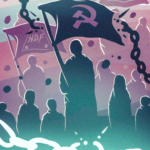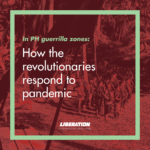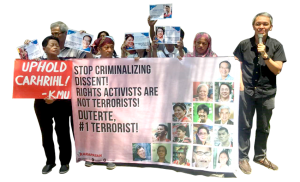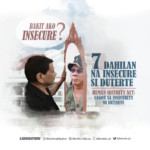In the Bog of Fascist Reaction
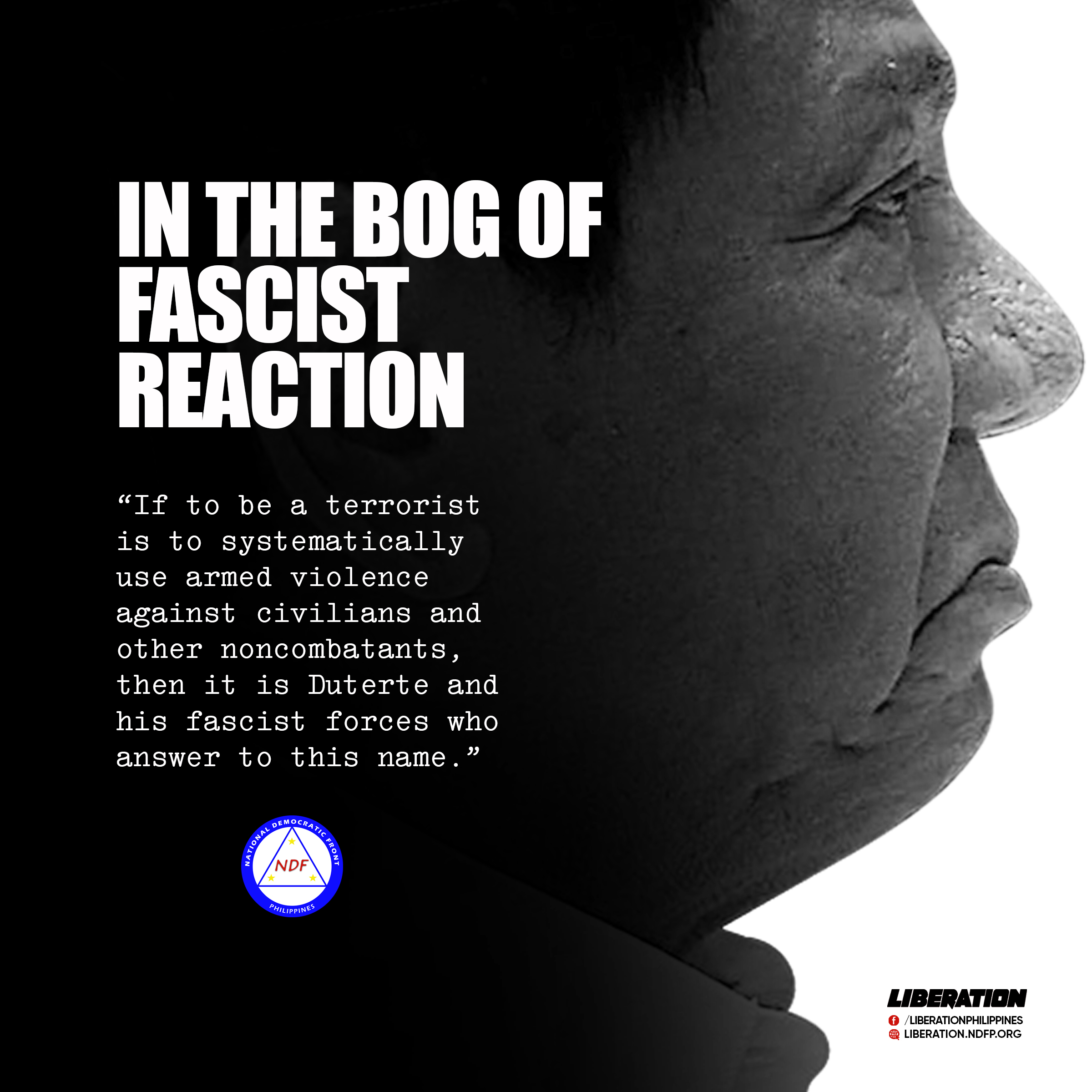
by Angel Balen
Into his third year in office, Rodrigo R. Duterte increasingly finds himself and his government getting mired deeper and deeper in the bog of fascist reaction, stumbling into one misstep after another.
A year ago he discarded his publicly declared wish to be the first “Left” president of the Philippines (the truth may be that he never had the political will to fulfill that wish). With misplaced hubris, the self-proclaimed erstwhile “socialist” unraveled himself as a fascist, and plunged his administration into this bog—disdaining to entertain the thought it would turn out this way.
Now he is confronted with multiple problems he can’t effectively tackle and properly resolve, no matter the means he employs, before his term ends in 2022. To begin with, many of the problems have sprung from his impetuous, little-thought-out and crudely-crafted policies and decisions.
Among these problems are:
- the continued implementation of martial law in Mindanao and his threat to impose it nationwide;
- his unilateral cancellation/termination of the Government of the Republic of the Philippines – National Democratic Front of the Philippines (GRP-NDFP) peace talks. He stopped just when these were promising to produce substantive agreements on social and economic reforms of immediate benefits to the Filipino people. He shifted to “localized” peace talks and unable to find any party willing to participate because the framework is “negotiate to surrender”;
- his proclamation of the Communist Party of the Philippines (CPP) and the New People’s Army (NPA) as “terrorist organizations” and filing before a regional trial court, through the justice department, a petition for proscription that listed names and “aliases” of over 600 individuals presuming them to be “terrorist suspects” sans any vetting, as admitted by his current justice secretary. (Four of such individuals—including Satur Ocampo and Rafael Baylosis, independent cooperator and NDFP consultant, respectively, in the GRP-NDFP peace talks—have succeeded, through written replies to the summons served to them, to get the court to exclude their names from the list);
- the continually rising incidence of extrajudicial killings and other human rights violations, particulary among the peasants and
- indigenous people, due to the implementation of the Armed Forces of the Philippines’s (AFP) counterinsurgency program, Oplan Kapayapan;
- the unrelenting pursuit of the “war on drugs” (with 25,000 people so far estimated to have been killed) and the prospect—which Duterte dreads—that the International Criminal Court would decide to investigate and judicially proceed against him for committing crimes against humanity;
- the campaign to eradicate graft and corruption, over which Duterte recently expressed having become tired and exasperated and threatened to step down from the presidency as he says his regime will rise or fall on the issue of corruption; and
- Duterte’s shift-to-federalism project (aimed at giving him excessive powers during the interim or transition period), currently snagged in Congress. His own neoliberal economic team says its funding requirement threatens to upend state financing and disrupt the regime’s economic development program. His minions at the Department of Interior and Local Government attempt to push a flagging “RevGov” plan calling for an extra-constitutional “People’s Council” (a parody of “people power”) that would keep Duterte in power until a new form of government would have been installed.
Aside from these problems, pressing for more immediate and long-term solution are the current crisis of sharply rising inflation, the recurrent shortage of rice supply and soaring prices of food and other basic necessities; and the economy’s slowing growth rate. His regime performed poorly in 2017 towards achieving the 257 economic and social development targets for 14 sectors under the Duterte Philippine Development Plan. Here are the figures from the Philippine Statistics Authority: high likelihood of achieving only 111 targets; medium prospect of attaining 29 others; and low probability of fulfilling 117 targets. Also the tracking of various indicators, by research outfits and economists, show the Philippines ranking last (“kulelat,” says economist Cielito Habito) among developing nations of Southeast Asia.
DUTERTE’S MARTIAL LAW IN MINDANAO
The declared basis for Martial Law (which Duterte and his military and security advisers chose to take while on an official visit to Moscow) was to enable the state security forces to contain and crush a so-called attempt by the Islamic State (IS/ISIS)-inspired, represented by the Maute and Abu Sayyaf “extremist”. This groups had an initial estimated force of 300 fighters, to establish an IS “province” in Marawi by mounting a siege on the only Islamic city in the country.
Originally intended to last five months, the declaration was first extended to end of 2017 (even as its objective was supposedly already attained in October, with the seiging armed groups wiped out and Marawi City devastated). Yet Duterte further extended it till end of 2018, claiming martial law is still needed to complete the suppression/eradication of the violently extremist groups, now tagged as “terrorists”, and to safeguard the security of the civilian population.
In declaring and extending ML, he got the concurrence of a pliant Congress in joint session and the approval of a lenient Supreme Court.
But how is the situation in Mindanao today, almost a year after ending the so-called Marawi siege?
Thousands of displaced Marawi residents, with inadequate supply of their daily needs, remain in crowded evacuation centers in Iligan City and nearby areas or stay in the similarly crowded residences of relatives or friends. The rehabilitation of the devastated city lacks funding to get started. Much of the reconstruction work is to be given to Chinese contractors, which the Marawi residents disapprove of, primarily because they have been excluded from the planning and rebuilding process that they say doesn’t take into account their culture, religious belief and practices. The people of Marawi also resent and protest the construction of a new military camp in the city center and the refurbishing of the previously existing one.
As regards the suppression/eradication of the remaining “terrorist” groups and safeguarding the security of civilians, the martial law extension hasn’t been effective. Just within a month, three bombing incidents occurred in public places (in Lamitan, Basilan on July 31; in Isulan, Sultan Kudarat on August 28 and September 1). All together the bombings killed 16 people and wounded 50 others. None of the perpetrators have been arrested.
State security officials have attributed the Lamitan bombing to the IS/Maute-Abu Sayyaf group, and alleged that six foreign IS members allegedly operating in Mindanao have yet to be accounted for.
On the other hand, the same officials blamed the Isulan bombings on elements of the Bangsamoro Islamic Freedom Fighters (BIFF), who are opposing the passage and prospective implementation of the Bangsamoro Organic Law (BOL, formerly the Bangsamoro Basic Law or BBL). They concede that the BOL will not bring about the long-sought peace among the Bangsamoro in the immediate future—a peace that Duterte has repeatedly promised to his Muslim kin (he says his mother has Maranao blood).
The knee-jerk reaction of Malacanang to the bombing incidents, suggesting further extension of martial law in Mindanao, only fueled the Mindanaoans’ cynicism over the government’s promise of a “mantle of security” under martial law.
An oblique rebuke to the martial law proponent-implementors came recently from a US State Department key official, who categorically answered a question of visiting Filipino journalists at the East-West Center in Hawaii: Was martial law effective in combating terrorism in Mindanao? “No. That is the short answer,” replied Irfan Saeed, director of State Department’s Office of Countering Violent Extremism.
“The response to terrorism and our efforts in countering violent extremism,” Saeed added, “cannot be an excuse for an overly aggressive law enforcement approach.” (He referred to martial law as an “overly aggressive” step). He hit the nail on the head when he said that “suppression of basic human rights [a key element of martial law] is a potential driver of terrorism… (because) you’re actually bringing a greater ability to recruit people to violent extremism.”
Saeed apparently spoke out of American experience: the formation of the Islamic State began among the Iraqi political detainees, led by Bhagdadi, who had been held captive, tortured, humiliated and deprived of their rights by the US military in Abu Ghraib and other prisons in Iraq.
DUTERTE’S ABANDONMENT OF THE GRP-NDFP PEACE NEGOTIATIONS
Duterte’s chief peace negotiator, Labor Secretary Silvestre Bello III, and his peace adviser, Jesus Dureza, have repeatedly lamented—in the many instances when Duterte hemmed and hawed on the matter—that their principal (the President) was letting slip away the opportunity to leave a “lasting legacy of peace” to the Filipino people.
The failure of the two, who are both Duterte’s bosom friends, to prevail on him to hold fast on his promise to pursue and complete the peace negotiations, would be casting away the precious time and efforts they had invested in the peace negotiations since the mid-1990s. As Duterte lets go the chance to leave a lasting legacy to the people, they too would miss the opportunity to earn popular approbation and prestige as peacemakers. Bello and Dureza would end up as “collateral damage” of Duterte’s abandoning an honorable peace and falling back to wage a dishonorable and unwinnable war.
DUTERTE’S WAR VS. THE PEOPLE’S RESISTANCE
Recently Duterte threatened to no longer accept “surrenders” from the NPA and incited state soldiers to shoot upon sight NPA suspects and all those he considers as “enemies of the state.” Now this is unconscionably brutal, far worse than the order to the police to shoot dead drug suspects who “fight back” (“nanlaban”).
Jose Ma. Sison, NDFP peace panel chief political consultant, interpreted this to mean that Duterte’s “line of localized surrender negotiations has utterly failed and he has turned his home region into a bigger cauldron of armed conflict.”
On Duterte’s taunt that the Left revolutionary forces cannot control even a single barangay, Sison riposted:
“The local organs of political power of the People’s Democratic Government of workers and peasants are in thousands of barangays all over the country, attending to the needs and interest of the people neglected and abused by the reactionary government.”
“Best proof of this fact,” Sison added,” is that the counterrevolutionary and tyrant Duterte and his military have deployed all their 98 Army maneuver battalions as well as police brigades against so many guerrilla fronts in a futile attempt to suppress the revolutionary forces and communities with [the use of] terror and deception.”
For its part, the NDFP Public Information Office has criticized the Duterte regime’s move to proscribe as “terrorist organizations” the CPP and the NPA. It stated:
“The proscription petition… forms part of the regime’s attempt to strip the Philippine revolutionary movement of legitimacy and recognition as a national liberation movement, thereby denying it and every suspected revolutionary of their rights and protection under International Humanitarian Law and other instruments governing armed conflicts.”
Furthermore, it emphasized, the petition vainly aims “to eliminate the strongest and most consistent opposition against Duterte’s scheme to establish an open fascist rule.” Duterte’s desperation, it added, “grows as the people’s resistance mounts, not only against his tyranny but also against spiralling inflation, low wages, deteriorating social services, onerous taxes, widespread contractualization, trade union repression, landgrabbing and expansion of land monopolies, and other burdens.”
At the same time, the NDFP-PIO noted, the proscription bid is a desperate attempt by the Duterte regime to divert attention from its own human rights record. It elaborated:
“The regime wants to cloak its escalating counterrevolutionary war with the mantle of legality, to imbue with legitimacy the widespread political killings, illegal arrests and detention and the attacks against civilians and other unarmed adversaries and strip the victims of all possible means of redress.
“If to be a terrorist is to systematically use armed violence against civilians and other noncombatants,” it concluded, “then it is Duterte and his fascist forces who answer to this name.” ###


